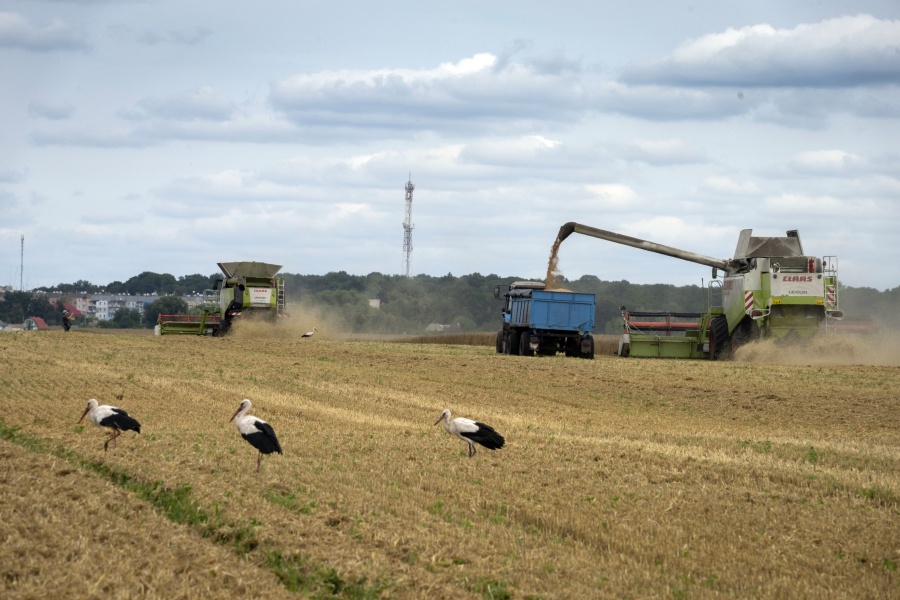KYIV, Ukraine (AP) — A ship docked in a Ukrainian Black Sea port on Friday to begin loading up with wheat for hungry people in Ethiopia. It will be the first food delivery to Africa under a U.N. plan to unblock grain trapped by Russia’s war on Ukraine and bring relief to some of the millions worldwide who are on the brink of starvation.
For months, fighting in Ukraine and a Russian blockade of Ukraine’s ports meant that grain produced in Ukraine, one of the world’s key breadbaskets, piled up in silos. That sent global food prices sky-high and led to hunger in Africa, the Middle East and parts of Asia. In recent days, several ships carrying grain have left Ukrainian ports under the new deal — but most of those shipments were animal feed and went to Turkey or Western Europe under previous contracts.
U.N. spokesman Stephane Dujarric said the ship named Brave Commander will carry its wheat to the Horn of Africa nation of Djibouti, where it will be unloaded and sent on to Ethiopia.
“The wheat will go to the World Food Program’s operations in Ethiopia, supporting the Horn of Africa drought response as the threat of famine stalks the drought-hit region,” he said. “It is one of many areas around the world where the near-complete halt of Ukrainian grain and food on the global market has made life even harder for the families already struggling with rising hunger.”
The ship was expected to take on more than 23,000 metric tons, according to Ukraine’s Infrastructure Ministry — still only a tiny portion of the 20 million tons of grain languishing now in Ukraine. It docked in the port city of Yuzhne late Friday, the ministry said.
Ethiopia, along with neighboring Somalia and Kenya, is facing the worst drought in four decades in the Horn of Africa. Thousands of people across the region have died from hunger or illness this year. Forecasts for the coming weeks indicate that for the first time, a fifth straight rainy season will fail to materialize. Millions of livestock, the basis of many families’ wealth and food security, have died.
“Millions of households will struggle to cope with these shocks” in Ethiopia, according to a new assessment by the Famine Early Warning Systems Network. “Food assistance needs are at record levels, with up to 15 million people in need of food assistance.”
While one shipment won’t solve the crisis, the World Food Program still heralded it as an “important step” in getting Ukrainian grain out of the country to the worst-affected countries. Ethiopian officials did not respond to requests for comment.
Yet on Ukraine’s front lines, the fighting was incessant, especially in the eastern region of the Donbas, where much of the fighting has been centered as the war approaches the six-month mark. The town of Kramatorsk was hit by 11 rockets overnight. Seven people were killed and 14 others were wounded in and around the town, which remains cut off from gas, running water and electricity.
“Three quarters of the population of the region have already been evacuated, because incessant shelling by the Russian army doesn’t leave civilians any choice — it’s either to die from wounds, or from hunger and cold in winter,” Donetsk regional governor Pavlo Kyrylenko told Ukrainian television.
The threat of a nuclear accident also loomed in southern Ukraine, where shelling has hit near Europe’s largest nuclear plant.
Shelling near the Russian-controlled Zaporizhzhia nuclear power plant continued overnight. Russian forces fired more than 40 rockets at the city of Marhanets, which is across the Dnieper River from the power plant. Three people were wounded in the most recent shelling, including a 12-year-old boy. The neighboring city of Nikopol was shelled as well, said Valentyn Reznichenko, the governor of the Dnipropetrovsk region.
The U.N. nuclear chief warned late Thursday that “very alarming” military activity at the nuclear plant could lead to dangerous consequences.
International Atomic Energy Agency Director-General Rafael Grossi urged Russia and Ukraine, who blame each other for the attacks at the nuclear plant, to immediately allow nuclear experts to assess damage and evaluate safety and security at the sprawling nuclear complex. He said the situation at the plant “has been deteriorating very rapidly.”
He pointed to shelling and several explosions at Zaporizhzhia last Friday that forced the shutdown of its electrical power transformer and two backup transformers, forcing the shutdown of one nuclear reactor.
Ukrainian Interior Minister Denys Monastyrsky said authorities were drafting plans to evacuate residents from towns and villages near the plant.
“There is a high-level threat, so there are plans for any possible development, including release of radiation,” Monastyrsky said Friday. “We all have seen the Russian shelling of the plant. It’s horrible.”
He said Russian forces have stationed weapons at the plant and have denied Ukrainian nuclear workers access to some areas in the complex.
“It’s hard to even imagine the scale of tragedy if the Russians continue their action there,” he said. “We have become convinced that there is no restraining factors. There is a deliberate stand declared by the Russian authorities that they are ready for any action, regardless of consequences.”



